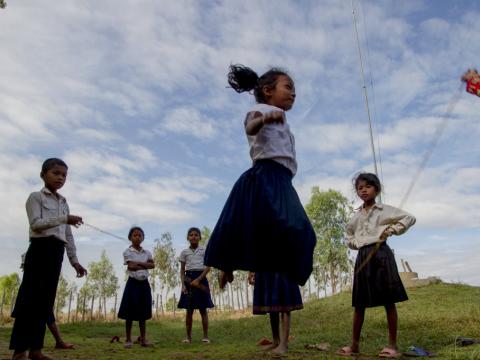New way to school for children in Stong district

Jumping over a rope in the shade of her schoolyard’s gangly trees, Sreykeo enjoys playing with her friends before explaining they used to have to wade through potentially dangerous water on the way to school.
“I had to hitch up my skirt and the boys had to roll up their trousers to walk through the water,” the 10-year-old says, before running to the corner of the yard with her friends and a bucket to wash her hands and face with water from the school’s new pump.
During the rainy season, lasting from July to December, the students had to splash through a 200-metre stretch of water, which at up to one metre in depth regularly interrupted the education of young children in the kindergarten and the first and second grades because they were too short to cross safely.
“I was afraid that the children might drown because we couldn’t keep an eye on all of them,” says Kiri Tet, Principal of Ampil Primary School.
“Only the taller ones could walk through the water to school,” the 55-year-old continues. “I was worried that the water would sweep the younger ones off their feet, so we asked them to stay at home.”
Overwhelmed with water during the rainy season, the community faced severe water shortages in the dry months, with the pupils forced to fetch water 200 metres from their school every time they wanted to flush the toilet or wash their hands. The withered vegetables in the school’s fenceless garden not eaten by animals, meanwhile, quickly died.
Commenting on the school’s hygiene during the water-starved months, 10-year-old Reaksa says: “It was dirty and the smell was disgusting.”
World Vision reached the community at the end of 2013 and set in motion a project to construct a high-level road for students to access school easily, as well as a pump well, twin water tanks and two extra toilets to provide them with a clean and convenient water source and improve hygiene.
A new fence also protects the school’s yard and garden, allowing the pupils to practise cultivating vegetables and play safely in the shade of the canopy above. Principal Kiri says: “They [the students] grow five-ridged morning glory.”
Over 260 students, including 88 World Vision-sponsored children, benefit from the upgraded school, with the pupils arriving outside its gates on the back of scooters and bicycles rather than being dropped off 200 metres away and made to trudge through the murky water.
Local World Vision official, Kimseak Suy, says: “We work with adults to encourage them to send their children to school, and invest in its facilities, so the kids enjoy school and attend regularly.”